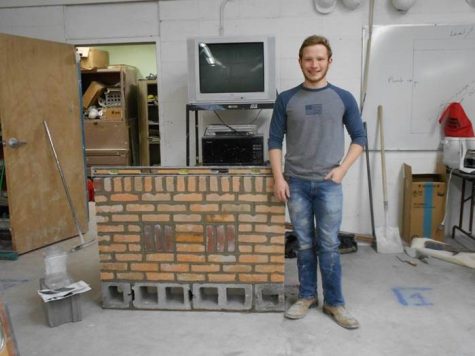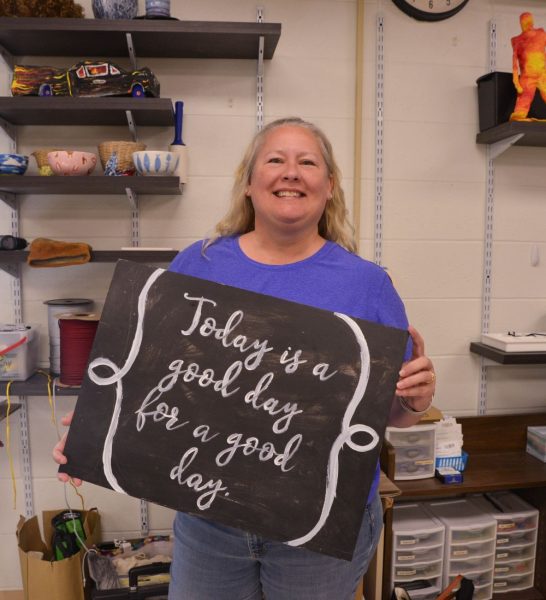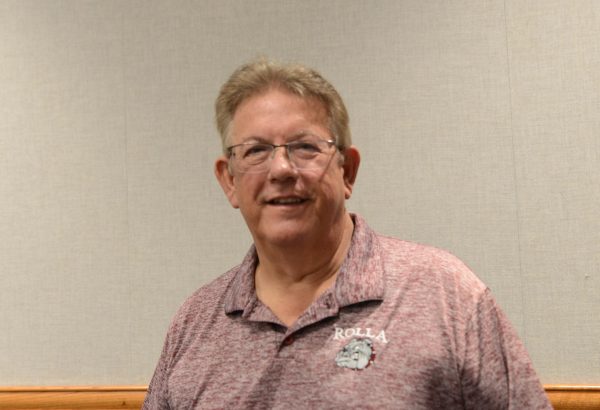Veterans share stories, advice, hope for students
The brick building spanning across the spacious lawn in the middle of St. James is mostly known to the public for it’s firework shows and trick-or-treat events on Halloween. The Veteran’s Home provides much more than that, it provides care and a place to stay to the parents and grandparents of many St. James area citizens.
Each resident of the Veteran’s Home served in a branch of the United States military. Wesley Herweck’s branch of choice was the Marine Corps, as his father told him he was not good enough to be a Marine. He joined as soon as he graduated high school in 1963, and soon after, he was thrown into war.
“In 1965 I was sent to Vietnam as part of the Marine Artillery,” Herweck said.
Herweck was not scared, he was trained. Even his brother, who had steel bones in his arm to replace damage done by cancer, fought in Vietnam.
He laughed as he described talking about taking apart a 105 Howitzer, a large artillery weapon, with his captain.
“I told the captain ‘If they find out, you and I both go to prison.’ He asked if I could do it and I said ‘Yes sir,” Herweck said.
Herweck’s captain offered him anything he needed to get the job done. He asked for just one new combat boot, and cut a disk out of it. He slid the new disk into place and completely reassembled the artillery piece.
“the gun was firing when I left,” Herweck said.
He paused, shifted in his wheelchair, and looked towards his hat sitting on his bed. He “learned a lot in Vietnam” was all he could say about his time in war.
He now suffers from diabetes caused by Agent Orange, a chemical that nearly four million people were exposed to during the war, that is now banned.
When Herweck returned from war, he witnessed and suffered from not only physical disabilities, but mental. He spoke passionately about the lack of support and acknowledgement from the public when soldiers returned home.
“We lost 60,000 men in Vietnam, and countless more when they came home,” Herweck said.
The numbers of Vietnam veterans that committed suicide are inconclusive at best, but it is factual that veterans are at a 22 percent high risk of suicide, and adequate therapy was not provided for Vietnam soldiers when they returned home.
Before the Vietnam war even began, talk of therapy and PTSD was not heard of, Jackie Roberts was joining the army.
“I went in the army in 1950 and I took basic training at Fort Sill, Oklahoma. From there I went to California, and from there I went to Korea,” Roberts said.
During the Korean War, Roberts mostly guarded the 38th Parallel and was a Browning Automatic Rifleman. He proudly spoke of how big and heavy the gun was, nearly 20 pounds.
After nine months, he was sent home. Mid conversation, he casually recalls that day.
“I got blown up by a hand grenade. Well that’s what they said, I don’t remember. I was in the hospital for a couple weeks,” Roberts said.
He was awarded the Purple Heart for his service, but he mostly speaks of the cold.
“The cold was worse than the fighting. Then in the spring it would start raining, the monsoons they called it. We had mashed potatoes and even they would rot,” Roberts said.
The cold froze his feet and back, helping, along with the effects of the grenade blast, to put him in a wheelchair in his old age.
Before the wheelchair, he was 18, educated through the eighth grade, and “scared half to death” of what he had to do.
“People getting killed bothers me still to this day. It isn’t a natural thing to do. I’ve seen children so hungry their stomach swells up with malnutrition. There is something wrong with anyone that glorifies war. It is terrible and I was scared. That was the farthest I’d ever been from Salem.” Roberts said.
Herweck agrees that war is something to always avoid, but does not regret his time spent serving in Vietnam.
“I went over there so you could be here. I went to Vietnam for everyone in this country. It was a nasty war, and I learned that we all bleed red. That makes us all brothers. The ones that didn’t make it all bleed red, the ones that did make it still bleed red,” Herweck said.

Those playing tennis at the courts in town have probably noticed the pavilion being built over the past year. However, most students have not realized...







